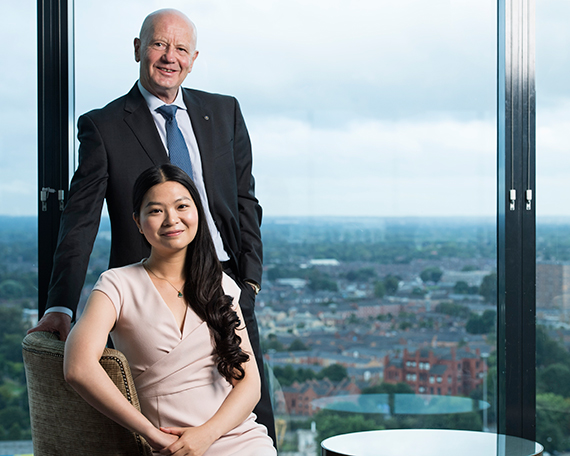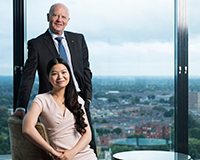 To persuade overseas investors to put their money into UK cities, it’s important you understand their business culture as well as their investment needs. Louisa Clarence-Smith spoke to one firm specialising in the Chinese market. Portrait by Jon Parker Lee
To persuade overseas investors to put their money into UK cities, it’s important you understand their business culture as well as their investment needs. Louisa Clarence-Smith spoke to one firm specialising in the Chinese market. Portrait by Jon Parker Lee
Will Chinese investors continue to invest in Manchester post-Brexit? With London property selling at a discount, there are fears a tide of money flowing into the regions, looking for higher yields, could be ebbing.
However, Bolton-based Gibbs Investment, a niche firm specialising in advising Chinese investors on commercial property, is expanding its team at home in Greater Manchester, in London, and in its Hong Kong office.
“There is lots of Chinese investment coming into Manchester right now, and we see that growing,” says founder Philip Gibbs. “There’s a little bit of a hiccup with Brexit and the prices in London being discounted. But in Manchester there is still a great deal of interest.”
Gibbs Investment was formed in September 2014 as an arm of chartered surveyors firm P R Gibbs & Co. One of its first deals was a tie-up between Chongqing Jinstar and Manchester & Cheshire Construction to bid for sites to help the region achieve its target of 55,000 new homes by 2027.
Since then, acting on behalf of Chinese clients, it has been shortlisted for two major residential schemes in Manchester – one around £70m and one around £100m.
“That was the first real significant success we had,” Gibbs says. “Although in the end we didn’t win, we were shortlisted.”
Gibbs thinks the firm’s USPs of cultural understanding of Asian investors and performance-based fees will drive the business’s growth.
“We have an element in our fee scale that means that the more we can shave off the acquisition price, the more we earn. So our incentive is to save the cost for our clients,” Gibbs says.
He spent a lot of time researching Chinese business culture before entering the market, describing it as a learning curve. Investment from UKTI North West in 2013-14 helped fund marketing, training and market intelligence. In China, Gibbs commissioned some research from the China Britain Business Council, which introduced him to potential clients.
Through the CBBC, he was able to build up strategic partnerships in China – with law firms, wealth management companies and educational organisations – to help access investor and developer clients.
“In China, the culture seems to be one where there’s a long lead-in time of building up relationships before a deal can be done,” Gibbs says. “There’s a lot of trust issues in China, but we thought we could short-circuit that by teaming up with companies who had already got their client base and offer services of helping Chinese and South East Asian investors to find opportunities in the UK.”
Gibbs has also hired several Chinese nationals to help navigate the culture gap (see p81).
Brexit has had an impact on investor appetite.
Lyslee Li, China business development manager, says: “I have some clients who told me, after the Brexit vote, ‘Hold on a moment, look how things are going in the UK, especially the political uncertainty. No one knows what will happen’.”
However, Li has other clients who have more confidence in the UK. Some are interested in London, because of the discounted prices and depreciated pound; others are interested in cities such as Manchester and Liverpool because of the Northern Powerhouse project and the opportunity for higher yield return if they are less risk-averse.
Institutional investments in residential and hotels are the biggest opportunities for Manchester at the moment, she says. This is a result of the two direct air routes to China from Manchester Airport and the weak pound, which is encouraging international students and tourism from the middle classes of mainland China.
Li thinks the Northern Powerhouse agenda will be very important in guaranteeing future investment from China. This is because, in China, people who follow government policy tend to profit. “You work against it, you’re in trouble,” she says.
Gibbs Investment is ready to profit. In the next 12-18 months the company will become the primary brand, disconnected from P R Gibbs & Co.
Can continued capital be guaranteed from the Far East? Li, at least, is won over by the UK market.
“I think real estate captures the jewel-drop and reflects the whole society of the UK,” she says. “Through this industry, you can see democracy in this country and this is an amazing thing.”
Bridging the cultural divide
Lyslee Li, China business development manager, who is originally from Sichuan, joined Gibbs in 2015, three years after graduating from the University of Manchester with an MSc in finance and business economics.
In China, she says, business follows friendship. “They first want to become friends, then talk about business.”
Time management, due diligence and communication are also crucial. “It’s very important to understand not only their investment requirements but also how much time you want to spend building up a relationship,” she says.











